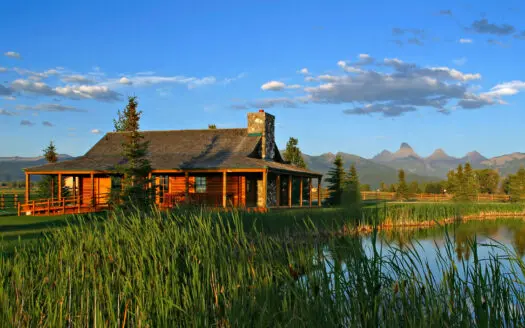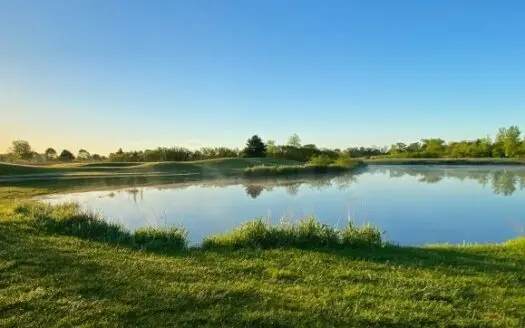15 Things to Consider Before Buying a Cottage | United Country Real Estate
15 Things to Consider Before Buying a Cottage
Whether you’re looking to purchase your own cozy cottage or create a rental property, it’s important to look at the big picture before signing on the dotted line.
Cottages have been used as escapes from city life for centuries and are still popular destinations for adventurous travelers and families alike. However, if not properly prepared, buying a cottage can become a costly project that may end up costing more than you thought.
Before purchasing any type of vacation home, there are important factors to consider first. These range from budgeting, location, and resale value to amenities such as access to playgrounds or beachfront activities.
Read on to find out how you can ensure you make the right decision when buying a cottage.
1. Location
When choosing the perfect location for your getaway and dreaming about waterfront sunsets, remember that access is key.
A country property such as a cottage in a prime location should have primary amenities and still be accessible to grocery stores, pharmacies, banks, and other services you may need when spending time at the property.
2. Size of the Lake
Having access to a larger body of water gives you more options for recreational activities, such as fishing, swimming, sailing, and just enjoying the scenery.
A large lake also means that there are fewer boats on the surface at any given time, making it much quieter and more peaceful. Additionally, having a larger lake means there are more beaches or available shorelines if you choose to do water sports like tubing or water skiing.
If you’re looking for waterfront property for an investment purpose, larger lakes also offer higher value appreciation than smaller ones.
3. Type of Shoreline
Before buying a cottage, one should consider carefully the kind of shoreline they are looking for. Particularly if swimming and boating are part of the plan. For example, shallow coves have warmer water due to less exposure to wind and sun, which could make it more enjoyable for young children.
But those shallow waters with weeds may not be the ideal spot for boats and jet skis. Then there is lake versus beachfront lake vs river for more kayaking or canoeing adventures.
Ultimately, making sure that their desired activities can be enjoyed safely at the cottage’s waterfront is key to finding a dream destination.
4. Activities You Can Do On the Waterfront
When buying a waterfront cottage, there are certain activities to consider if you’ll be living an active lifestyle.
Will your home have access to swimming, fishing, and boating?
Do you plan on having guests over regularly or just occasional vacation getaways?
Can they bring their own boats and dock at the cottage?
Will there be enough space nearby for larger gatherings?
The options available will usually determine what kind of waterfront experience you’ll want. Take into account these activities when deciding whether a particular property is right for you.
5. Water Quality
When buying a cottage, one of the main factors to consider is the quality of the water. This should be high on your list of priorities, as clean and fresh drinking water is an essential requirement for any home.
It’s important to get an independent evaluation from a laboratory to assess the type and quality of water, as various contaminants such as bacteria or minerals can significantly reduce its portability.
Pay attention to where the water system drains out since this affects potential contamination and turbidity levels; it’s best if they are located far away from septic tanks or other nearby sources of pollution.
6. Wastewater System
Take a close look at the wastewater system. It’s essential that your cottage has access to its own on-site wastewater system. This involves investigating any septic tanks and/or cesspool regulations in your area, as well as inspecting the existing drainage system on the property to properly assess if it meets your needs.
Before committing to a purchase, consult with a local professional about possible upgrades and necessary repairs so that you can make an informed decision about purchasing the property.
7. Accessibility
Access to a cottage is an important consideration when purchasing one. Some cottages are not easily accessible, located on gravel roads, or only accessible via water in some cases.
This can make it difficult for you and your guests to arrive at the cottage without the appropriate transportation or logistics setup.
If the cottage is far from public infrastructure such as hospitals and shopping centers, that may create added risk and hassle for things like medical care or buying supplies. Thus, it pays to consider the access to your potential future cottage before making a purchase decision.
8. Access to Electricity and Internet
One of the most important considerations when you invest in a cottage or a vacation home is electricity and Internet access. Before making any decisions, it is important to do research on what kind of electrical services and/or Internet access are available in the area.
It may be necessary to contact the local power company or internet service provider for an estimate of what the monthly costs would be for installing these utilities, as well as any other associated fees.
Having a reliable source of power and internet will enable you to use all the amenities that come with owning a vacation home, such as running appliances and connecting with friends and family online.
Making sure there is adequate electricity and Internet access at your cottage is essential for ensuring a comfortable experience during your stay.
9. Elevation
When buying a cottage, it is important to consider its elevation. If the cottage is positioned too low, an area that can be prone to flooding or intense storms and rain could lead to costly problems if no preventative measures are taken.
On the other hand, cottages situated at a high elevation can often offer breathtaking scenery and cooler temperatures throughout the year, while also providing more protection from natural disasters and uncomfortable weather patterns.
For this reason, it is important to research the elevation of any potential cottage and determine whether it meets your needs before buying.
10. Exposure to Elements and Natural Surroundings
When you buy a cottage, it is important to consider the direction of the home. If it is located in areas prone to high winds, you may want to consider an option with more protection from the elements.
Unexpected rain and strong winds can be frustrating if you’re not able to enjoy your outdoor space like you initially envisioned.
Prioritize being close to open water, wooded terrain, or whatever other features you desire in order to easily take advantage of natural surroundings. A good location that takes into account these factors as well as noise level and privacy will make sure that your investment is a beautiful and peaceful spot for years to come!
11. Level of Privacy
When considering your dream cottage, it’s important to be aware of any potential privacy issues. One should first consider things like the proximity to neighbors and highways or streets as these can cause noise and other disturbing factors that could affect one’s experience at their cottage.
Moreover, looking into any existing trees on the property can be beneficial as it can provide some much-needed privacy from passersby or noisy neighbors.
Making sure to perform research beforehand is key when it comes to making sure one’s cottage will provide the desired level of tranquility.
12. Empty vs. Developed Lot
An empty lot will likely require more time and money upfront to build the structures and amenities you desire, while developed lots are usually ready-to-move-in cottages that have an existing coastal profile, dock, beach area, and buildings already in place.
The advantage of purchasing an empty lot is that you can customize the space exactly to your desires. Deciding between an empty and a developed lot depends on your preferences as well as availability within your desired location and budget.
13. Presence of Pests
A perfect cottage is free of pests such as mice, ants, termites, and spiders. An inspector can help identify any active infestations you may have as well as gaps in your home’s walls or floors that could lead to future infestations.
Once identified, pest control companies can provide advice on ways to prevent pests from entering your property and give free estimates on treatments to get rid of any existing ones.
It is also important to look around the building’s exterior points such as window frames and doors. Any cracks or holes need to be sealed off before you move in to limit new pest infestations coming in through these access points.
14. Information From a Local Realtor
Before considering buying a cottage, it is important to do research and speak to a local realtor or a real estate agent. They can provide critical information on factors such as the current market trends, school districts, zoning regulations, deed restrictions, and building codes specific to the area you are looking at.
Realtors can also help narrow down your search by helping you identify what criteria would suit your needs best when selecting a cottage.
Additionally, they will be able to advise you if there are areas of the property that need repair or work so that you can budget for these projects in advance!
15. When to Buy
Buying a cottage during the peak season will usually be more expensive than buying one outside of the peak season.
Conversely, if you purchase at a time when there is no demand for cottages in your area, you may end up with an exceptional bargain.
Seasonal changes can affect the maintenance and condition of your cottage; think about the weather and other seasonal activities such as boating or hunting that may affect your property. Lastly, don’t forget to check local zoning regulations before purchasing any property.
Making Your Cottage Purchase a Rewarding Experience
Having a cottage or a cabin is an exciting and rewarding experience. However, it is important to consider all the factors before investing in one.
From determining whether you want an empty lot or a developed one to researching local zoning regulations, there are many things to consider before taking the plunge.
If you’re ready for that country living, find your dream cottage or cabin at United Country Real Estate.




